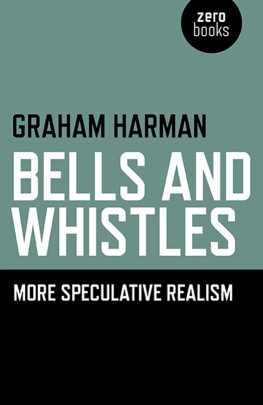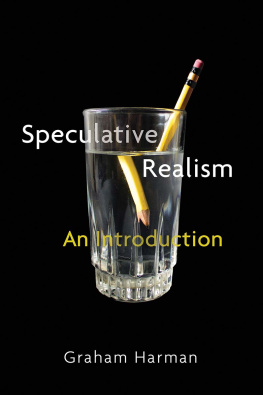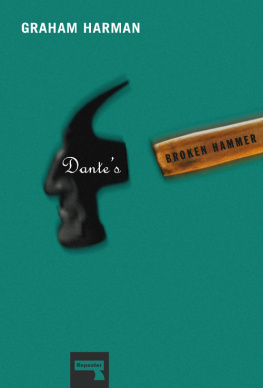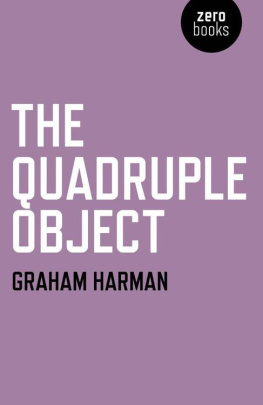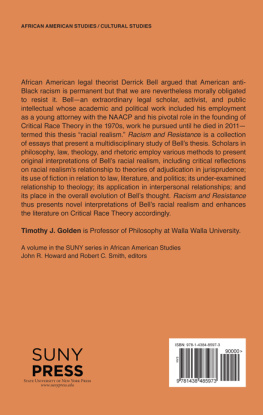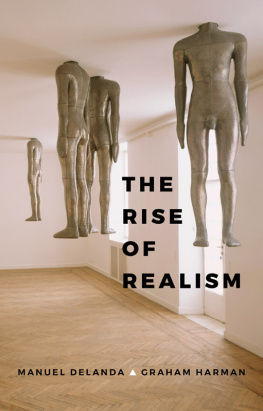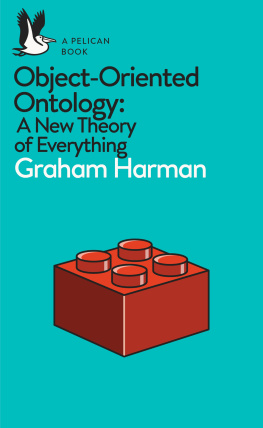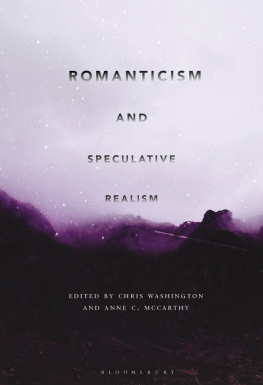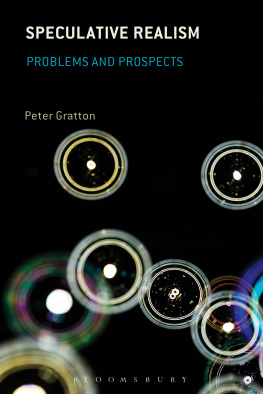Graham Harman - Bells and Whistles: More Speculative Realism
Here you can read online Graham Harman - Bells and Whistles: More Speculative Realism full text of the book (entire story) in english for free. Download pdf and epub, get meaning, cover and reviews about this ebook. City: Winchester, Washington, year: 2013, publisher: Zero Books, genre: Science. Description of the work, (preface) as well as reviews are available. Best literature library LitArk.com created for fans of good reading and offers a wide selection of genres:
Romance novel
Science fiction
Adventure
Detective
Science
History
Home and family
Prose
Art
Politics
Computer
Non-fiction
Religion
Business
Children
Humor
Choose a favorite category and find really read worthwhile books. Enjoy immersion in the world of imagination, feel the emotions of the characters or learn something new for yourself, make an fascinating discovery.
- Book:Bells and Whistles: More Speculative Realism
- Author:
- Publisher:Zero Books
- Genre:
- Year:2013
- City:Winchester, Washington
- Rating:5 / 5
- Favourites:Add to favourites
- Your mark:
- 100
- 1
- 2
- 3
- 4
- 5
Bells and Whistles: More Speculative Realism: summary, description and annotation
We offer to read an annotation, description, summary or preface (depends on what the author of the book "Bells and Whistles: More Speculative Realism" wrote himself). If you haven't found the necessary information about the book — write in the comments, we will try to find it.
Bells and Whistles: More Speculative Realism — read online for free the complete book (whole text) full work
Below is the text of the book, divided by pages. System saving the place of the last page read, allows you to conveniently read the book "Bells and Whistles: More Speculative Realism" online for free, without having to search again every time where you left off. Put a bookmark, and you can go to the page where you finished reading at any time.
Font size:
Interval:
Bookmark:


First published by Zero Books, 2013
Zero Books is an imprint of John Hunt Publishing Ltd., Laurel House, Station Approach,
Alresford, Hants, SO24 9JH, UK
www.johnhuntpublishing.com
www.zero-books.net
For distributor details and how to order please visit the Ordering section on our website.
Text copyright: Graham Harman 2013
ISBN: 978 1 78279 038 9
All rights reserved. Except for brief quotations in critical articles or reviews, no part of this book may be reproduced in any manner without prior written permission from the publishers.
The rights of Graham Harman as author have been asserted in accordance with the Copyright,
Designs and Patents Act 1988.
A CIP catalogue record for this book is available from the British Library.
Design: Stuart Davies
Printed and bound by CPI Group (UK) Ltd, Croydon, CR0 4YY
We operate a distinctive and ethical publishing philosophy in all areas of our business, from our global network of authors to production and worldwide distribution.
Late in 2010, Zero Books published my collection Towards Speculative Realism: Essays and Lectures. The chapters in that work consisted of material arranged chronologically from 1997 through 2009: from my latter years as a doctoral student at DePaul University through the earliest years of the Speculative Realism movement. Towards Speculative Realism proved to be a greater success than anticipated. Whatever inherent philosophical interest the book may have had was clearly augmented by its Bildungsroman structure, with the struggling graduate student of the early chapters replaced by an internationally visible author in the final pages of just a dozen years later. The chronological feel of the book was further enhanced by an italicized introductory paragraph at the head of each chapter, often referring to failures or human dramas of the sort that most authors suppress during triumphant recaps of their careers. This structure was meant to encourage the legions of depressed and demoralized graduate students in our midst, as if to say: your current invisibility, your enfeebled productivity, your rejection by conferences and publishers, and your struggles with tyrannical advisors could well mean nothing a decade from now. Judging from the often poignant quality of reader mail since 2010, the book has had considerable benefit in healing the wounded.
Bells and Whistles is a book in much the same vein as Towards Speculative Realism, but it covers the period from 2010 through early 2013: a time of public battles rather than obscure student futility. By the last two chapters of the book, we were entering a period of significant change. The Speculative Realism and Object-Oriented Ontology movements had fragmented, their original members busied with mutual articulation of disagreements. Tristan Garcia, a young French thinker of great promise below), was on the verge of appearing in English and shaking up the battle lines among Speculative Realists. Other significant changes in my work environment were afoot.
Since the chapters in this book were written as standalone pieces and not as organic parts of an integrated book, the reader can expect a certain amount of repetition: Heideggers tool-analysis continues to appear frequently, as does Husserls transformation of Twardowski, the distinction between under-mining and overmining assaults on objects, and lingering complaints about Bruno Latours 1999 assertion that entities are no more than whatever they transform, modify, perturb, or create. Quentin Meillassoux is a frequent target of disagreement; Levi Bryant a bit less so. And since many of the chapters of Bells and Whistles were either oral presentations, interviews, or blog posts, an informal style permeates the whole. In my 2011 book on Meillassoux, I proclaimed the benefits of studying a living philosopher in the midst of public emergence.Bells and Whistles, much like Towards Speculative Realism, allows readers an inside look at my own recent career, with continued glimpses of success, failure, and conflict. In this way they will be able to see each of these chapters as embedded in a wider human life, and perhaps will come to appreciate the obstacles in their own lives as elements of an intellectual drama rather than as biographical distractions from antiseptic theory.
With age it becomes much easier to write (though somewhat harder to find the time to read). The calming rhythm of routine, the natural decrease of youthful anxiety, the waning nervous energies of middle age with their newfound indifference to imaginary threats, the fresh flood of invitations for lectures and written work, concrete professional incentives, a more settled personal and financial life, and growing self-confidence in ones own intellectual footingall these factors can add up to a staggering productivity. The Derridas and the ieks with their multiple books per year are not thirty times more energetic than you are, but simply three times as old and ten times more welcomed. Avoid affectation, scorn the transient pressures of your era, stay close to what you care about most, and someday you may find your thoughts ripe and in demand.
In order to pre-empt any trollish queries as to which of these chapters are the bells and which are the whistles, we can agree to use the term whistle for the brief : a blog post, an unpublished fragment, and a pair of interviews. The other chapters are lectures or essays of a more traditional sort, and here the metaphor of bells can be replaced at will by the figures of pipe organs, tom-toms, bassoons, or any heavier instrument of the readers choosing.
Along with traditional print media, the blogosphere has become increasingly important in the dissemination of Speculative Realism and Object-Oriented Ontology. If the online philosophy world often resembles the Wild West with all its shootouts, marshals, and cattle rustlers, it also offers frontier justice and scattered nuggets of gold. In January 2009 I launched my own blog, Object-Oriented Philosophy, under the nickname Doctor Zamalek (a reference to the Cairo island neighborhood where I live). After a brief shutdown in March 2009, the blog was relaunched at a slightly different address.The following post, from July 23, 2010, is the one most often cited in standard academic publications, and thus it seems useful to place it in the present collection. Its topic is the difference between two philosophical movements with which I am closely involved: Speculative Realism [SR] and Object-Oriented Ontology [OOO], which partially overlap but do not coincide. Due to increased public confusion of the two phrases by the summer of 2010, it seemed wise to state their differences explicitly. I have made no attempt to smooth out the typically improvised and shoot-from-the-hip style so common to the blogosphere, but I have made some minor changes in punctuation and paragraphing, while adding a few explanatory footnotes concerning related material.
An increased amount of email has started to pour in over the past few weeks, much of it quite gratifying. One thing Ive noticed from a lot of the mail is that SR and OOO have started to bleed together in many peoples minds. For example, [Quentin] Meillassoux is sometimes being referred to as an object-oriented philosopher, which isnt true. So, for those who are new to this part of the blogosphere, here is a renewed summary of what the different terms mean.
Font size:
Interval:
Bookmark:
Similar books «Bells and Whistles: More Speculative Realism»
Look at similar books to Bells and Whistles: More Speculative Realism. We have selected literature similar in name and meaning in the hope of providing readers with more options to find new, interesting, not yet read works.
Discussion, reviews of the book Bells and Whistles: More Speculative Realism and just readers' own opinions. Leave your comments, write what you think about the work, its meaning or the main characters. Specify what exactly you liked and what you didn't like, and why you think so.

